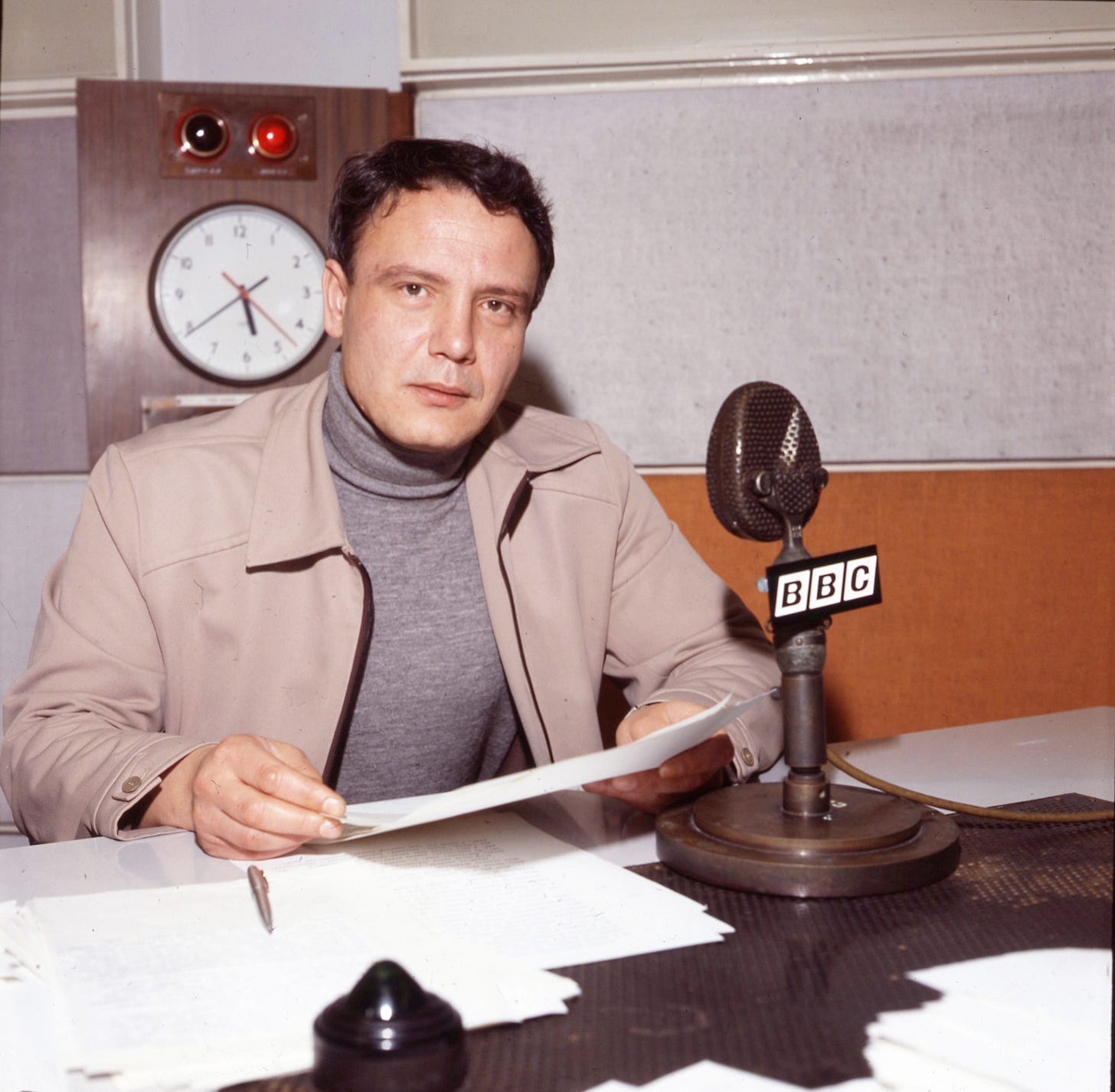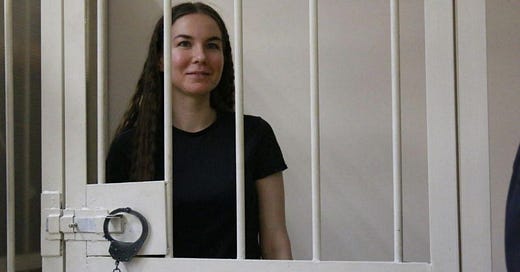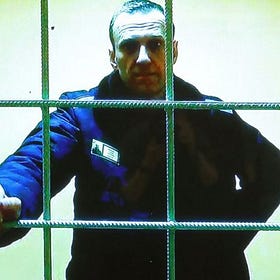The return of ‘punitive psychiatry’? Detained in hospital for posting on social media
In the USSR, dissidents were often forcibly consigned to psychiatric wards and treated with drugs against their will. Could the practice be staging a comeback?
By Natalia Zotova.
Viktoria Petrova was arrested in May 2022, accused of spreading ‘fake news’ about the war in Ukraine. The 29-year-old from St Petersburg had been on social media, re-posting videos from activists designated ‘foreign agents’ by the Russian authorities. But instead of time in a jail cell, the court sent Petrova to a psychiatric hospital.
She is not the only political prisoner to be subjected to medical treatment as a form of punishment. BBC Russian takes a look at how the system works.
In March 2022, Viktoria Petrova published a post on the Russian social media platform ‘VKontakte’ in which she condemned the war in Ukraine, along with the Russian leadership that ordered the invasion. She attached a series of videos to her post, including clips from activists labelled ‘foreign agents’ by the Russian authorities.
The post led to charges of spreading ‘fake news’ about the Russian army. Arrested in May 2022, Petrova spent more than a year in pre-trial detention. Later, during the trial itself, the court ruled that she should be transferred to a psychiatric hospital.
Her lawyer, Anastasia Pilipenko, describes Petrova’s mistreatment when she arrived there: "They forced her to undress for a ‘body search’ in front of male medical staff, even though there were plenty of female staff to hand,” she says.
“When Viktoria requested to change her sanitary pad because her period had started and blood was running down her legs, everyone mocked her – male and female staff alike.”
According to Pilipenko, Petrova was forced to take a shower in the presence of male staff before being tied to a bed and injected with substances that rendered her virtually unable to speak for two days. The treatment ceased only after it was brought to light and reported in the media.
Psychiatric examination is a routine procedure in Russia during the preliminary investigation of most defendants. Generally, it’s an outpatient matter: specialists visit during pre-trial detention, the job is completed in a single day, and the defendant’s lawyer is allowed to be present.
They would hold my arm and escort me to the toilet and sit opposite, watching me do my business…They took away everything from me, leaving only a pack of wet wipes and a book. They dressed me in some kind of granny’s blouse and an old smelly dressing gown. Plus a pair of panties that I periodically just washed in the sink.
In Petrova’s case, the psychiatrists said they needed more information. So the young woman was sent to hospital for a month, making it much harder for her lawyer to have any control over what happened there.
“The criminal code doesn’t deprive me of the right to be present during a hospital examination. But hospitalisation lasts for a month, and while doctors are able to monitor her round the clock, I can’t be there with her in hospital every day,” explains Pilipenko.
In Petrova’s case, her lawyer says, the result was that a psychiatrist gave a ‘free account’ of her responses during examination. In their report, the doctors decided that Petrova was at times unable to control her actions or be responsible for them, and also posed a danger to herself and others. They did not provide any justification for the conclusions they reached.
Petrova and her lawyer demanded that the psychiatrists be summoned to court to explain why they considered her lacking in mental capacity. The hope was that the court would exclude the psychiatric examination from the evidence and request a new one. This didn’t happen.
How it worked in Soviet times
In the USSR, psychiatry was systematically deployed against those who opposed the communist regime. ‘Anti-Soviet consciousness’ was declared a mental disease by Nikita Khrushchev – if you were against the system, you had to be crazy.
The principle was developed by the future head of the Politburo, and then KGB boss, Yuri Andropov, who ordered the creation of a network of psychiatric hospitals to defend the ‘Soviet government and socialist order’ against political opponents.
Dissidents could be deemed mentally sick and forcibly detained in such hospitals. Thousands of would-be social and political reformers found themselves incarcerated. They could be held indefinitely - no court decision was required, and there was no right of appeal. ‘Patients’ were often forcibly injected with psychotropic drugs.
Among the most well-known was Vladimir Bukovsky, who wrote at length of his experiences in the Soviet psychiatric system and drew the attention of the West to the abuses. He was eventually expelled from the USSR in a prisoner swap and died in London in 2019.
Like most dissidents, Bukovsky was initially detained for psychiatric evaluation at the Serbsky Institute in Moscow. It remains operational to this day. Some senior staff have worked there since Soviet times.
The question of whether the centre is primarily a medical foundation or ‘an organ of power’ was raised again in June last year when Putin called for the establishment there of a research department to investigate ‘the social behaviour of LGBT people’.

Pilipenko says the psychiatric system is regularly used in political cases because it suits both investigators and the courts. Psychiatric treatment in Russia is generally voluntary. The exception is when a court orders treatment without consent. In law, a court is not obliged to heed expert opinions. But in practice, says Pilipenko, judges tend to blindly trust the specialists who conduct the examination.
Crucially, psychiatrists don't have to establish a direct connection between their diagnosis and the alleged crime. "Poverty might drive someone to shoplifting. At the same time, they may have a mental illness. And that’s it! They’re sent for indefinite involuntary treatment," Pilipenko says.
Conditions in psychiatric hospitals are milder than in pre-trial detention centres. But those who have been there describe a total control that is even more stringent than in prisons.
"They stuck me in a ward and on the same day gave me some tablets. I don't know what they were, but I couldn't refuse them: I had to take them in front of the doctor and show I had swallowed them,” says journalist Anastasia Kashkina in an interview with ‘Nastoyashoe Vremya’, labelled a foreign agent by the Russian authorities. She initially agreed to treatment, but when she tried to leave the hospital a court order meant she was forced to remain.
“They would hold my arm and escort me to the toilet and sit opposite, watching me do my business. Basically, my first impression was of a horror movie with total restriction on any actions. They took away everything from me, leaving only a pack of wet wipes and a book. They dressed me in some kind of granny’s blouse and an old smelly dressing gown. Plus a pair of panties that I periodically just washed in the sink."
It is also easier to exert pressure on a defendant in hospital than in a pre-trial detention centre. "In prison, I can visit my client for up to five days a week, while in a psychiatric hospital, visits are limited to only two days," says Pilipenko.
The prosecution may also benefit from the fact that court proceedings are closed to the public when the case involves a psychiatric diagnosis. Decisions about compulsory treatment, as opposed to verdicts, don’t have to be published. The upshot is that the public has fewer means to gauge whether the number of people facing political charges being sent for ‘treatment’ instead of imprisonment is growing or not.
Modern ‘punitive psychiatry’?
As far back as 2016, the ‘Agora’ human rights association (designated by Russian authorities a 'foreign agent' and an ‘undesirable organisation’) published a report on the resurgence of punitive psychiatry for political prisoners. They remarked on how the threat of being sent to a psychiatric hospital was used by the courts and during investigations to put pressure on suspects and the accused.
Those who enter the psychiatric system tend to disappear from the news agenda. For example, Alexander Gabyshev, the shaman from Yakutia, was followed by the whole country when he set off to Moscow on foot to 'exorcise Putin’ in 2019. Then he was arrested, and in 2021 sent for psychiatric treatment by court order. Almost the only thing known about Gabyshev since then is that he is still in hospital.
Those who speak out against the war in Ukraine can also be subjected to forced treatment. A court in Tver region this spring sent Sergey Kolin to psychiatric hospital after he attempted to enlist in the 'Freedom of Russia' legion, made up of Russians fighting for Ukraine. There has been no news about him since.
In October 2023, a court ordered hospitalisation for Nizhny Novgorod activist Alexei Onoshkin. He had posted on 'VKontakte' about the Russian shelling of the Mariupol drama theatre where civilians had been hiding in the basement. The court deemed his post 'fake news' about the Russian army.
Right now, physicist and mathematician Sergei Abramov, a noted expert on supercomputers, is undergoing psychiatric examination in hospital. He was arrested for transferring money to a banned organisation — presumed to be Alexei Navalny's Anti-Corruption Foundation (declared an extremist organisation in Russia). The process will last a month, but can be extended.
It's important to note that unlike a prison term, a court decision on compulsory treatment amounts to an indefinite sentence. The Constitutional Court reaffirmed this legal principle in November. A person shall remain in hospital until doctors determine they no longer need treatment. And the decision cannot be challenged.
"Even if internally it’s thought that the patient no longer needs such treatment, without clear legal criteria for determining the duration of involuntary hospitalisation, a patient is typically kept there for at least half the jail term they would have served had they been determined to be sane,” the ‘Agora’ report states.
“More often than not, though, they get the full term. Extending the stay in the hospital every six months is an absolute formality.”
Petrova’s lawyer Pilipenko says her defendant would have preferred a prison sentence because at least that way she would know when she would be released.
In her final statement in court on December 21, Petrova chose not to speak about herself, but reiterated her views on the war in Ukraine. You can’t save anyone by killing tens of thousands of people and destroying everything around them, she said. Sooner or later, war crimes will be investigated. She called on Putin and the Russian authorities to bring to an immediate end the hostilities in Ukraine.
Five days later, Petrova was sentenced to six months of compulsory treatment in a psychiatric hospital. Pilipenko points out that the duration of the initial judgment can be extended by a special medical commission virtually indefinitely. She and Petrova intend to appeal against the sentence.
Read this story in Russian here.
English version edited by Chris Booth.
“Victims of Disappearance”: Why it’s so easy for detainees to go missing in Russia’s prisons
The rules that allow a prisoner’s location to be kept secret during transit often can be used to put pressure on the detainee — almost always a political prisoner, as it suits the Russian authorities.
Ukraine war: The Russians snitching on colleagues and strangers
In Soviet Russia it was common for people to report others to the authorities - now the practice is back.






